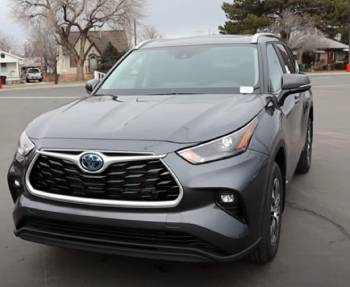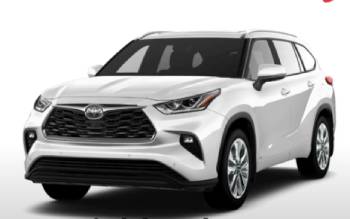The automotive landscape is undergoing a transformation, and hybrids are rapidly becoming the buzz of the town. Among the frontrunners is the 2023 Toyota Highlander. The Highlander has had quite a reputation for its reliability, design, and overall driving experience.
In 2023, potential buyers face a quintessential question: Should they opt for the Highlander Hybrid or stick to the traditional Gas model?
A Brief Comparison Table
| Feature/Aspect | Highlander Hybrid 2023 | Highlander Gas 2023 |
| Powertrain | Gas + Electric Motor | Gasoline Engine |
| Transmission | CVT | Direct-shift |
| Fuel Efficiency | Higher | Standard |
| Emissions | Lower | Higher |
| Maintenance Complexity | More complex | Straightforward |
| Initial Cost | Typically higher | Typically lower |
| Potential Long-term Costs | Battery replacement | Regular maintenance |
| Resale Value Influencers | Battery & hybrid system | Mileage, age, condition |
| Driving Experience | Quieter, eco-focused | Traditional, power-focused |
In essence, both the Highlander Hybrid and Gas 2023 have their unique selling points. The choice between them will pivot on a potential owner’s preferences, budget, driving habits, and values.
Highlander Hybrid 2023: The Pros and Cons

Pros:
- Fuel Efficiency:
The primary allure of any hybrid vehicle. The Highlander Hybrid 2023 is no exception, boasting impressive miles per gallon, outperforming the gas variant substantially.
- Eco-Friendly:
Emitting less CO2 and other pollutants means a smaller carbon footprint. Environmentally-conscious drivers, this one’s for you.
- Silent Starts:
The electric motor grants a quieter and smoother start-up and low-speed drive, perfect for city commutes.
- Tax Incentives:
In several states, hybrid vehicle owners enjoy tax breaks, rebates, and other financial incentives.
Cons:
- Higher Initial Cost:
Generally, the Hybrid variant comes with a higher sticker price than its gas counterpart.
- Battery Replacement:
Although designed to last, the hybrid battery might need replacement, which can be a pricey affair.
- Complexity:
The dual engine system (gas + electric) is more complex. Maintenance might require specialized knowledge.
Also Read: Differences Between General Gmax AS-05 And Michelin Tires.
Highlander Gas 2023: The Pros and Cons

Pros:
- Power:
Traditionalists argue that gas engines provide better throttle response and power, especially during overtaking or uphill driving.
- Initial Cost:
Typically cheaper upfront than the hybrid version.
- Simplicity:
With a more straightforward mechanism, mechanics are familiar with its nuances. Finding a service center is easy.
Cons:
- Fuel Economy:
Not as efficient as the hybrid model. Over time, this could mean more money spent at the pump.
- Environmental Impact:
Higher emissions make it less eco-friendly.
- Noise Levels:
Gas engines are generally noisier, especially during ignition and acceleration.
Key Differences Between Highlander Hybrid and Gas 2023
The 2023 Toyota Highlander, in both its hybrid and gas guises, is undoubtedly a compelling choice for SUV enthusiasts.
While both versions hail from the same parentage, they are unique in their own rights. Here’s a detailed examination of their key differences:
- Powertrain and Performance
Highlander Hybrid:
The Hybrid variant of the Highlander couples an internal combustion engine with an electric motor. This dual setup allows for:
- Electric-only driving at lower speeds.
- Regenerative braking, which recycles energy back into the battery.
- A Continuously Variable Transmission (CVT), which ensures smoother transitions between power sources and optimizes fuel efficiency.
Highlander Gas:
The Gas variant is powered solely by a traditional internal combustion engine. Features include:
- Direct-shift transmission, providing a tactile feel and direct engine response.
- More straightforward power delivery, which some purists might argue offers a better throttle response, especially in situations demanding a quick burst of power.
- Fuel Efficiency and Range
Highlander Hybrid:
- The hybrid is the champion when it comes to miles per gallon, owing to its dual powertrain system.
- Extended range: Thanks to its fuel efficiency, the hybrid can typically cover more miles on a single tank combined with its electric charge.
Highlander Gas:
- While not as efficient as the hybrid, the gas version still offers competitive fuel economy in its class.
- Standard range: Without the electric component, the range is solely dependent on the gas tank’s capacity and the engine’s fuel economy.
- Emissions and Environmental Impact
Highlander Hybrid:
- Lower CO2 emissions, contributing to a smaller carbon footprint.
- Combining electric power with gasoline reduces the overall pollutants released into the environment.
Highlander Gas:
- Solely reliant on fossil fuels, thus leading to higher emissions.
- While advancements have been made to reduce the environmental impact, it doesn’t match the hybrid’s eco-friendly nature.
- Maintenance and Longevity
Highlander Hybrid:
- Complex Mechanism: The dual-engine system means more components. This could lead to potentially higher maintenance costs.
- Battery Concerns: Over time, the hybrid battery might need replacement, which can be quite expensive.
Highlander Gas:
- Simplified Mechanism: Familiar to most mechanics, this reduces the potential for specialized repairs.
- Longevity: Gas engines have a time-tested record of reliability and longevity when maintained well.
- Initial Cost and Resale Value
Highlander Hybrid:
- Generally, the hybrid variant has a higher initial cost due to the addition of electric components and battery.
- Resale value can be influenced by factors like battery life and overall hybrid system health.
Highlander Gas:
- More affordable upfront.
- Resale value is more predictable as it aligns closely with the traditional metrics of mileage, age, and overall condition.
Also Read: Differences Between Discount And Costco Tires.
Frequently Asked Questions (FAQs)
Your decision should be based on your driving habits, environmental concerns, and budget. If you prioritize fuel economy and want to minimize your carbon footprint, the hybrid might be for you.
If you want a more robust driving experience and a lower initial price, consider the gas version.
No, the 2023 Toyota Highlander Hybrid is designed to run on regular unleaded gasoline, making it pocket-friendly at the pump.
Relative to its size and segment, yes. While the gas version provides decent fuel economy, the hybrid variant shines brighter in this aspect.
Exact numbers can vary based on driving conditions and habits. However, the Highlander Hybrid 2023 promises impressive mileage, often surpassing its gas-only counterpart by a significant margin.
“Better” is subjective. Hybrids offer better fuel economy and eco-friendliness but might come with a higher initial price and potential battery replacement costs. Gas models may provide a more potent driving experience and have a simpler mechanism, but they lag in terms of fuel efficiency.
Both can last long with proper maintenance. Gas engines have been around longer and have a proven track record. Hybrid technology, while newer, has matured significantly, with many older hybrid models still running strong on roads today. Battery life is a consideration for hybrids, but they are designed to last a considerable amount of time.
Wrapping Up
When comparing the Highlander Hybrid and Gas 2023, it boils down to what you prioritize. If saving on fuel costs and eco-friendliness rank high on your list, the hybrid might be your go-to. However, if you lean towards a lower upfront cost and a more traditional driving experience, then the gas version could be a more suitable pick.
Remember, the car-buying journey is personal. Evaluate both models, consider test drives, and choose what feels right for you. Safe driving!



